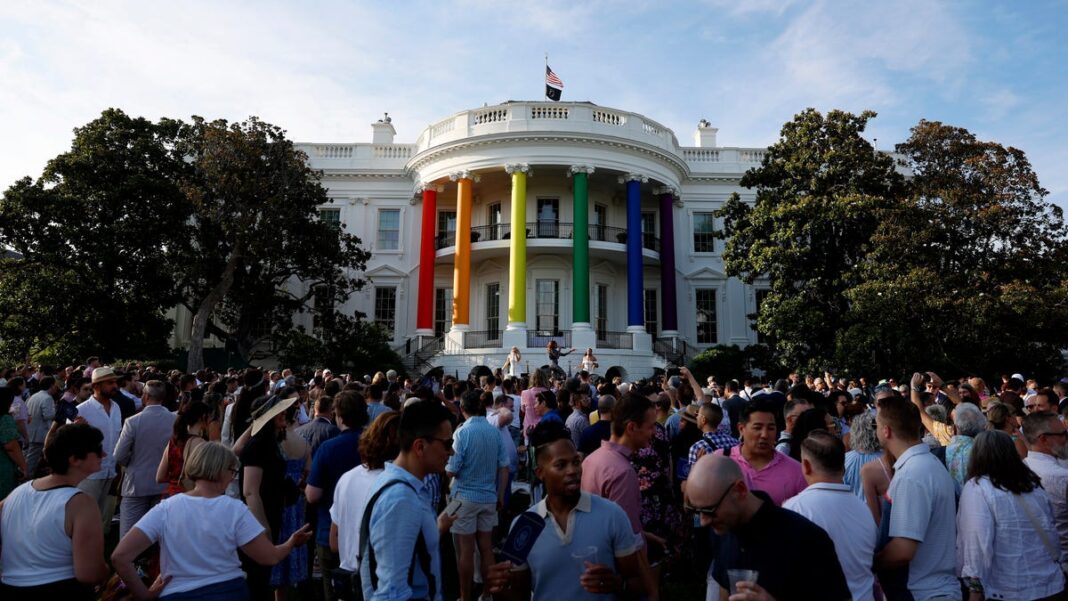What is Donald Trump’s position on gay marriage? Insights on his views regarding same-sex couples
The outcome of Donald Trump’s victory in the 2024 presidential election raised concerns among many in the LGBTQ+ community.
His campaign featured anti-transgender messaging, leading to a significant increase in outreach to crisis services from individuals in the LGBTQ+ community shortly after the election results were announced.
Fears about the potential jeopardy of same-sex marriage rights started to emerge, particularly in light of the U.S. Supreme Court ruling that nullified the federal protection for abortion in 2022, a decision made by justices appointed by Trump.
Despite strong public backing for same-sex marriage along with historic Supreme Court rulings, some argue that there is minimal reason for alarm regarding the preservation of same-sex marriage rights. Here’s an overview of what to consider with the upcoming administration.
What is Donald Trump’s position on same-sex marriage?
Trump’s views on gay marriage have changed over the years.
In 2000, he showed support for domestic partnerships during an interview with The Advocate, as reported by CBS News. This was a noteworthy stance considering most of the GOP did not share this perspective at the time. However, by 2015, he stated in a CNN interview that he favored “traditional marriage.” Yet, just a few days after his election in 2016, during a “60 Minutes” interview, he expressed that he was “fine” with same-sex marriage—contrasting sharply with the 2016 GOP platform that criticized the Supreme Court’s decision affirming the federal right to same-sex marriage.
The 2024 GOP platform notably omitted direct references to same-sex marriage, instead stating, “Republicans will cultivate a Culture that honors the Sanctity of Marriage, acknowledges the blessings of childhood, emphasizes the essential role of families, and supports working parents.”
When NBC News inquired if Trump intended to reverse same-sex marriage rights, the incoming press secretary, Karoline Leavitt, stated, “that was never a campaign promise he made.” Meanwhile, representatives from the Trump campaign and presidential transition team did not respond to repeated requests for comments from YSL News.
Is there a possibility of overturning same-sex marriage?
The Supreme Court established the legality of same-sex marriage nationwide in 2015 through the Obergefell v. Hodges ruling. In December 2022, President Joe Biden enacted the Respect for Marriage Act, which received bipartisan support in Congress, mandating that all states recognize same-sex and interracial marriages. Additionally, California, Colorado, and Hawaii took action by passing ballot measures in the November 5 election to secure same-sex marriage protections in their state constitutions.
The National Center for Lesbian Rights reassures that same-sex couples need not worry about their marriages being invalidated during Trump’s new administration. They highlighted a Supreme Court ruling in the Pavan v. Smith case post-2015 that reaffirmed same-sex marriage rights.
Polling from Gallup indicates that public support for legal marriage has increased from 58% in July 2015 to a peak of 71% in May 2022 and 2023.
“In a worst-case (though unlikely) scenario where the Supreme Court attempted to overturn its previous ruling on marriage equality, same-sex couples would still have the ability to marry in some states, and their unions would be recognized by other states and federally,” stated the NCLR’s analysis.
The Human Rights Campaign reinforced this perspective, suggesting that any move to rescind marriage equality would face considerable obstacles, and advised those anxious about safeguarding their families to seek guidance from an LGBTQ+ family law attorney.
“The election results are concerning for many Americans, particularly those within the LGBTQ+ community who are either in same-sex marriages or hope to enter one,” remarked Cathryn Oakley, Senior Director of Legal Policy at the HRC, in a statement to YSL News. “Nevertheless, it’s crucial to acknowledge that marriage equality is established law, and only one of the nine Justices has shown interest in reevaluating the Obergefell ruling,” in reference to Clarence Thomas’ expressed desire to reconsider the decision when the court invalidated Roe v. Wade in 2022.

